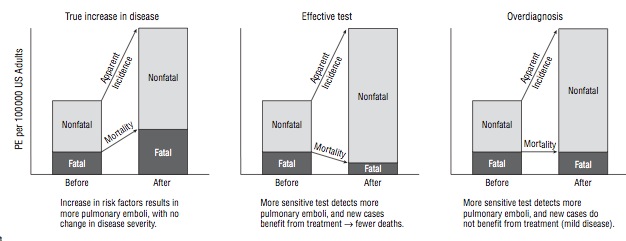Wiener, Renda Soylemez, Lisa M Schwartz, and Steven Woloshin. 2011. “Time trends in pulmonary embolism in the United States: evidence of overdiagnosis..” Archives of internal medicine 171 (9) (May 9): 831–837. PMID 21555660
Found this via a chap who commented on Weingart’s now famous PE episode.
I think this paper raises a lot of good points surrounding the “epidemic” of overdiagnosis of PE. The VTE literature is vast and complex yet some of the most basic questions lack substantive evidence.
The evolution of our approach to VTE has dramatically altered what a diagnosis of VTE actually means.
This paper is one of the first I’ve seen that tries to examine whether or not it’s fair to say that we are overdiagnosing PE. It is of course indirect evidence. Direct evidence would be a comparative trial of treatment vs no treatment.
METHODS
- they used the Nationwide Inpatient Sample to get the data. This is a huge dataset that is all ICD-9 codes from hospital discharges. ICD-9 codes have their problems but in this question they’re less relevant
- they compared the number of diagnoses of PE with the recorded mortality from PE. If all the PEs being diagnosed were of equal lethality then finding more of them and treating them should result in a lower mortality rate
- below is a graph of 3 potential outcomes
RESULTS
- the numbers of patients involved are in the hundred of thousands
- I think the little graph tells the story pretty well:
- there was a big increase in the number of PEs but no change in the mortality rate implying that we were just finding lots of PEs that don’t seem to kill people
- they tease this out with a bit more stats in the paper if you’re interested



Nice post Andy,
Certainly fuel for the fire… I agree that PE may represent multiple disease entites, ranging from the normal filtration function of the lungs to remove small clots from the circulation in a relatively benign way, to massive clots that cause obstructive shock and death.
Another problem with PE is whether or not it is the cause of death when present. You find a dead body, there is a PE on autopsy – was the PE an incidental clot the person was walking around with before some other fatal event, or did the PE kill them? This might be another confounder I suppose – which way, I’m not sure.
Cheers,
Chris
yeah the post-mortem stuff is really confusing – i have a vague recollection of a paper that found large PEs in post-mortems of people who had died at scene from major trauma. It just doesn’t really make sense
I think there’s some similar stuff in the ICU studies screening for DVTs – they seem to find an awful lot of them and we don’t quite know what they mean
Pingback: Pulmonary Embolus rears it’s ugly head again! | the underneaths of things
Pingback: mortality from pulmonary embolism
Pingback: The LITFL Review 037 - Life in the Fast Lane medical education blog
Pingback: Research and Reviews in the FASTLANE 003
Pingback: Research and Reviews in the FastLane 003
Pingback: R&R in the FASTLANE 004 • LITFL • Research and Reviews